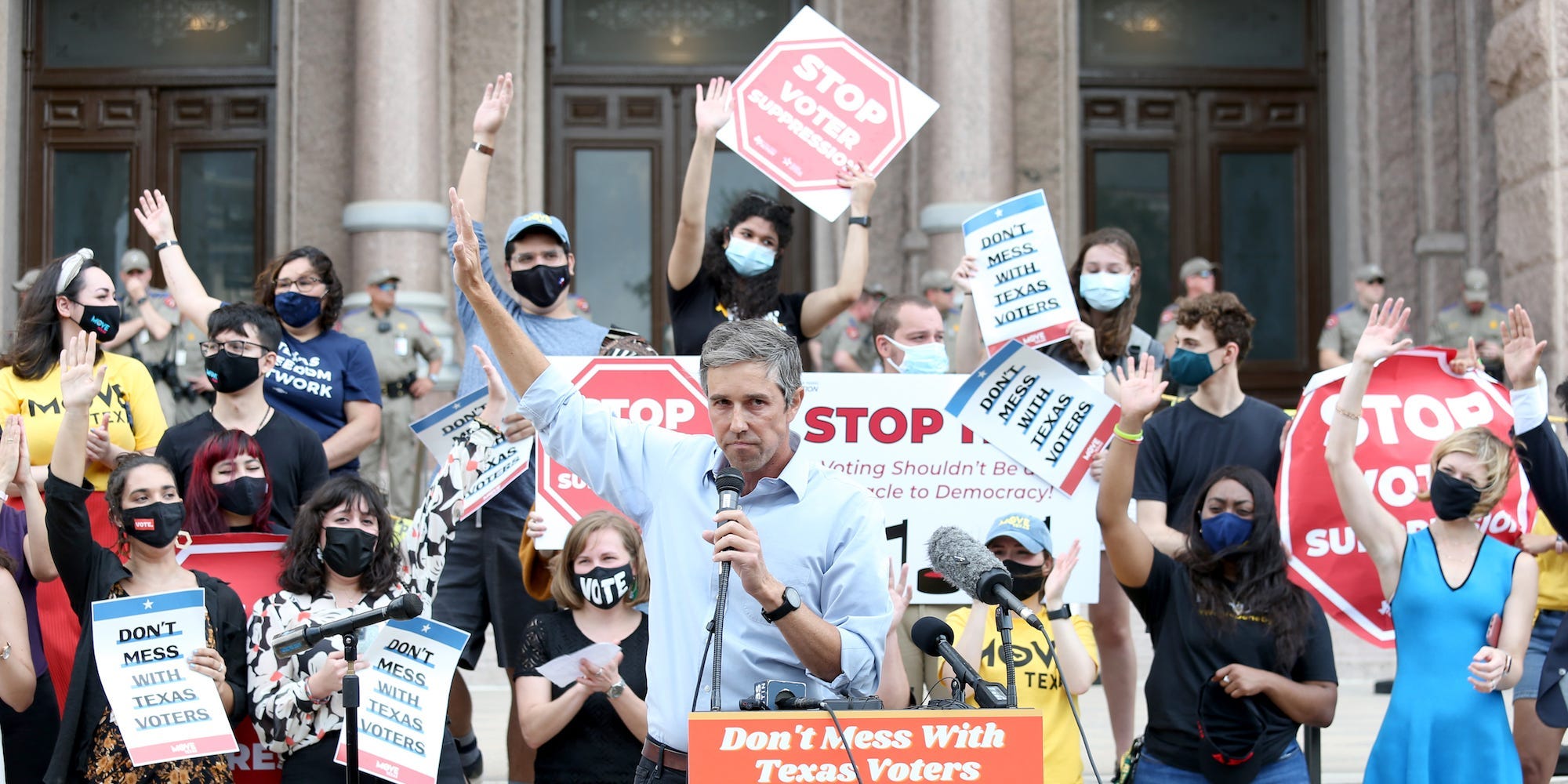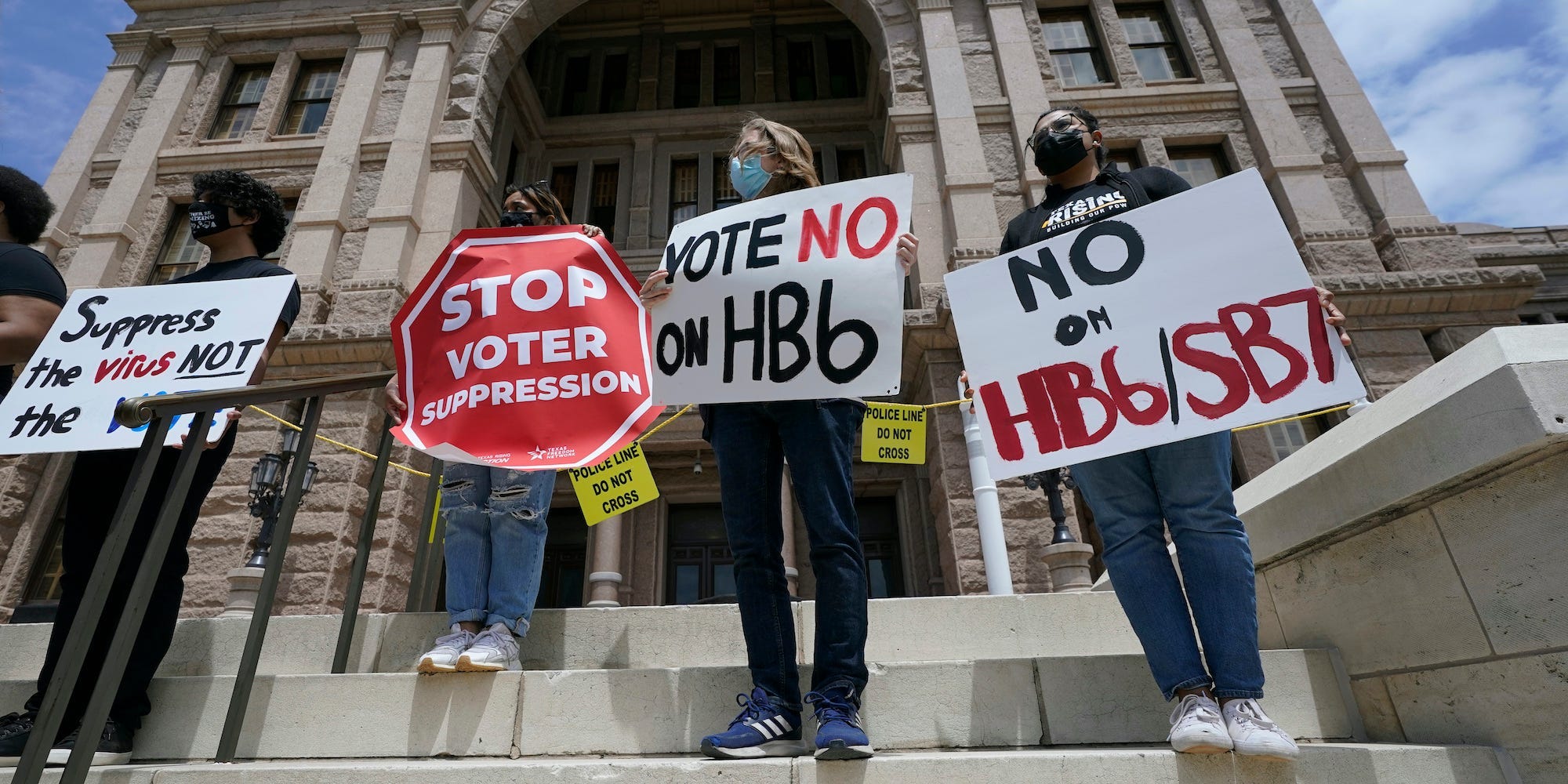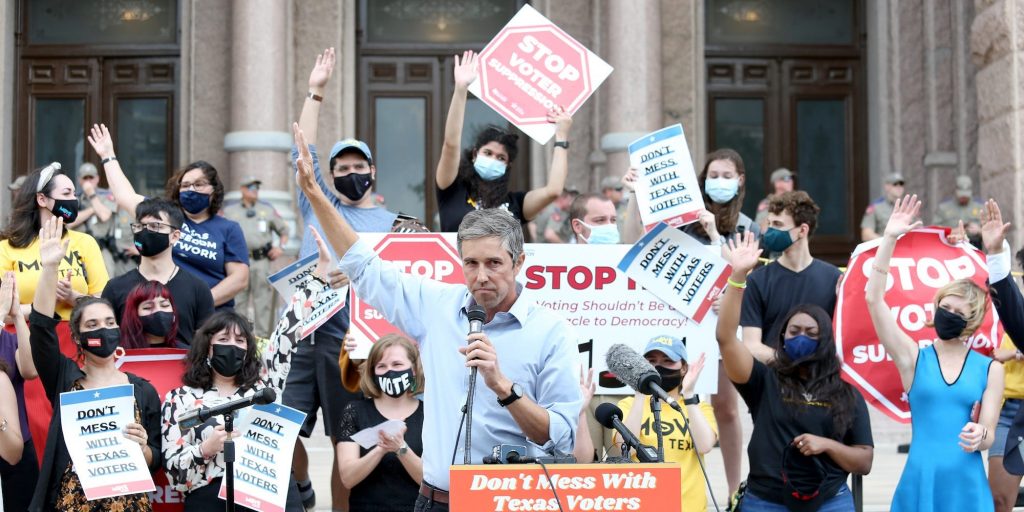
Gary Miller/Getty Images
- Texas Democrats blocked the passage of a major bill restricting voting in a dramatic walkout.
- Democrats left the chamber en masse, blocking the necessary quorum required to pass the law.
- The lawmakers' effort was only the fourth legislative walkout of its kind in Texas' history.
- See more stories on Insider's business page.
Democrats in the Texas state House blocked the passage of Senate Bill 7, a major GOP-backed bill restricting voting and tightening election rules, in an unprecedented and dramatic walkout late Saturday night.
Democratic members of the chamber walked off the floor to ensure there wouldn't be the quorum of lawmakers necessary to vote on the legislation, a move that killed chances of the bill being passed before a midnight deadline.
"Members take your key and leave the chamber discretely. Do not go to the gallery. Leave the building," Rep. Chris Turner, the chair of the Texas House Democratic Conference, told lawmakers at around 10:35 pm local time, according to reports in the Texas Tribune and the Washington Post.
"We were determined to run out the clock," Turner said in a statement. "It became obvious Republicans were going to cut off debate to ram through their voter suppression legislation. At that point, we had no choice but to take extraordinary measures to protect our constituents and their right to vote. Republicans have only themselves to blame for the way this Session is ending."
Legislative Democrats' walkout marks only the fourth time legislators had deployed such a move to block legislation in Texas' history. Lawmakers undertook similar walkout maneuvers in 1870, 1979, and 2003, according to the Dallas News.
-Lauren “Vaxxed to the Max” McGaughy 🌟 (@lmcgaughy) May 31, 2021
-Jen Rice (@jen_rice_) May 31, 2021

AP Photo/Eric Gay, File
SB 7, first introduced by Sen. Bryan Hughes in early March, went through weeks of significant revisions, changes, and parliamentary back-and-forth as it moved through both chambers of the legislature. The legislation caused tension between lawmakers at many points during the process up until the bill died as a result of the walkout on Sunday night.
The latest version of the bill would have had to pass the state House by midnight local time on May 30 to be sent to Gov. Greg Abbott's desk.
"SB 7 was changed in the back rooms and debated in the dead of night, with elements that were not in the version passed by the House or the version passed by the Senate, and with no public input or even public knowledge of what's in the final version of the bill," State Rep. John Bucy III, a Democrat, said in a statement after the walkout. "Our constituents never got to weigh in on the changes and new provisions of the most critical piece of voting rights legislation we've seen in decades."
The bill's contents, which were drafted by a conference committee and include elements of multiple laws proposed in Texas, were finalized right before the end of Texas' 87th legislative session.
The conference committee, made up of members from both chambers, finalized its work on May 29 The state Senate voted to suspend its usual rules to expedite consideration of the bill to debate and vote on it on Saturday evening, just a few hours after the conference committee report was released to lawmakers and the public.
The Senate then approved the version of the bill decide in the conference committee along party lines shortly after 6 am local time on May 30 before meeting an end in the current session.
The bill then went to the state House, where Democrats then blocked its passage. Republicans are highly likely to bring the bill up again in an expected special legislative session, which Abbott will have to schedule.
"Election Integrity & Bail Reform were emergency items for this legislative session. They STILL must pass. They will be added to the special session agenda. Legislators will be expected to have worked out the details when they arrive at the Capitol for the special session," Abbott tweeted late Sunday night.
SB 7 would have restricted many efforts of the voting and election administration process in Texas.
Most immediately, it would have cracked down on initiatives that local election officials, particularly Democratic officials in diverse counties like Harris County, undertook in 2020 to expand voting options during the COVID-19 pandemic.
The law would have banned election officials from offering drive-thru voting or holding voting locations open 24 hours a day during the early voting period, both of which Harris County did in 2020.
The legislation would have also only allowed Sunday voting to be held between 1 pm and 9 pm, a provision interpreted by some civil rights advocates as an attack on "Souls to the Polls" voting drives popular in African-American communities.
The law would have also made it a felony for election officials to send absentee ballot applications to voters who did not request them, which Harris County also attempted in 2020, broadened powers of partisan election observers, and lowered the threshold required to challenge and overturn election results in many cases.

